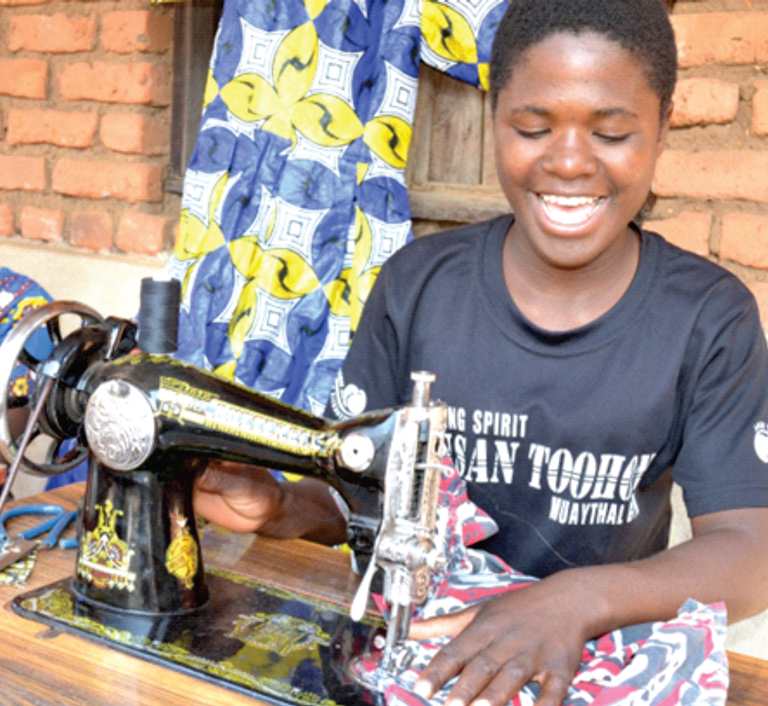Rescuing teen mothers out of dependency, poverty
Every Saturday, teenage mothers who were withdrawn from marriages converge at Stella Magombo’s house at Waliranji Trading Centre in Mchinji.
They undergo training in tailoring and designing.

Magombo, who is a child protection worker, is working with World Vision Malawi (WVM) in eliminating child marriages under the Bua Mtete Area Programme through the Bring Girls Back to School Campaign.
By end 2021, the campaign had already withdrawn 44 girls from child marriages and these have since gone back to school.
Apatsa Blessings, now 18, is among the girls who have returned to school in Waliranji Village, Traditional Authority Mavwere in the district.
“I was driven into marriage because of poverty at home. My parents could not provide me with school materials; hence, I decided to drop out and marry,” she said.
Magombo said Apatsa is one of the girls who opted for marriage after the parents failed to support her schooling.
Regrettably, teenage pregnancy, as various studies have revealed, is one of the major health and social problems affecting girls in Malawi.
The main drivers of teenage pregnancy, according to the study, include early sex and marriage; low contraceptive use, low educational levels, low socio-economic status, lack of knowledge on reproductive and sexual health; gender inequity and physical/sexual violence.
The consequences of unplanned pregnancy on teenage mothers have been tragic and compromised their physical, psychological and socioeconomic wellbeing.
Early motherhood can affect the psychosocial development of the infant.
The children of teenage mothers are more likely to be born prematurely with a low birth weight, predisposing them to many other lifelong conditions.
They are at a higher risk of intellectual, language and socio-emotional delays.
One study suggested that adolescent mothers are less likely to stimulate their infant through affectionate behaviour such as touch, smiling and verbal communication or be sensitive and accepting toward his or her needs.
Poor learning abilities in the children of teenage mothers has also been noted, with many of the children being held back at grade level, scoring lower on standardised tests and/or failing to graduate from secondary school.
Daughters born to adolescent parents are more likely to become teen mothers themselves while sons are three times more likely to serve time in prison.
On the other hand, teen pregnancy and motherhood can influence younger siblings.
One study found that younger sisters of teen mothers were less likely to emphasize the importance of education and employment.
They are likely to accept human sexual behaviour, parenting and marriage at younger ages, according to the study.
Magombo said with the help of WVM, local structures such as Mother Groups have dissolved 93 child marriages, so far.
Most of the teen mothers cite poverty and lack of parental support as drivers for their engagement in early sex and child marriages.
“But the biggest challenge is that, once withdrawn from marriages, we do not have the resources to assist them with materials to remain in school,” she narrated.
To address this problem, Magombo sourced sewing machines from WVM, which she is using to train the girls in tailoring and designing.
She disclosed that over the past months, the girls, under Girls Success Campaign have managed to sew and sell clothes whose proceeds have been channeled towards payment of fees for underprivileged girls.
“Our plan is to grow this business so that no girl withdrawn from marriage fails to return to school because of lack of fees. We are happy that WVM and Mary Year have adopted a few girls whom they are sponsoring now,” said Magombo.
Apatsa commended WVM for the intervention.
She said the tailoring and designing course she has undergone has built her capacity to fend for herself.
“I no longer have to beg for toiletries because I earn something from patching peoples clothes. I am now able to buy my basic needs such as toiletries and clothes for my baby,” she said.
World Vision district programmes manager for Mchinji, Mereena Mhone John, said through this intervention, her organisation has reached out to 93 teenage mothers in the area with the goal of sustaining well being of children, including the most vulnerable and registered children and maintaining them and in school.



